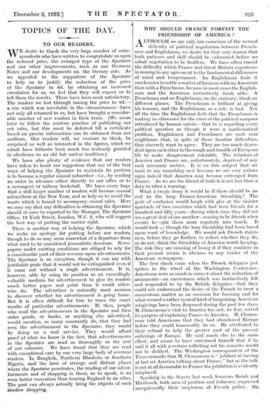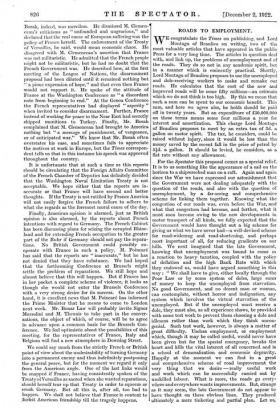WHY SHOULD FRANCE .FORFEIT THE FRIENDSHIP OF AMERICA?
ALTHOUGH we arc only too conscious of the normal difficulty of political negotiation between French- men and Englishmen, we desire for that very reason that both patience and skill should be exhausted before we admit negotiation to be fruitless. We have often traced the difficulty which France and Great Britain experience in coming to any agreement to the fundamental differences of mind and temperament. An Englishman finds it much easier to settle a matter of business with an American than with a Frenchman, because in most cases the English- man and the American instinctively think alike. A Frenchman and an Englishman, on the contrary, think on different planes. The Frenchman is brilliant at giving his reasons, and the Englishman, as a rule, is bad. Yet all the time the Englishman feels that the Frenchman is making no allowance for the error of the political compass introduced by human nature—that he is regarding every political question as though it were a mathematical problem. Englishmen and Frenchmen are such near neighbours that, in spite of these familiar difficulties, they sincerely want to agree. They are too much depen- dent upon each other in the rough-and-tumble of European life to make disagreement tolerable. The relations of America and France are, unfortunately, deprived of any such necessary motive. It is on this subject that we want to say something now because we see very serious signs indeed that America may become estranged from France. As we arc the friend of both it is not less than a duty to utter a warning.
What a tragic irony it would be if there should be an end to the long Franco-American friendship ! The gods of confusion would laugh with glee at the sinister spectacle of two countries which had been friends for a hundred and fifty years—during which time they did not see a great deal of one another—ceasing to be friends when events brought them more regularly into touch. It would look a3 though the long friendship had been based upon want of knowledge. We would ask French states- men, before they go further, to reflect whether they do, or do not, think the friendship of America worth keeping. The risk they are running of losing it if they continue in their present course is obvious to any reader of the American newspapers.
The first shock came when the French delegates put spokes in the wheel of the Washington Conference. Americans were so much in earnest about the reduction of armaments—an earnestness which was instinctively felt and responded to by the British delegates—that they could not understand the desire of the French to treat a momentous matter as an occasion for finessing and for what seemed a rather cynical kind of bargaining. American misgivings have been deepened during the past few days. H. Clemenceau's visit to America has riot, we fear, served its purpose of explaining France to America. M. Clemen- ceau told Americans that they had abandoned Europe before they could honourably do so. He attributed to their refusal to help the greater part of the present stifferings of Europe: He said much else to' the said° effect, and seems to have convinced himself that if he said it all with a certain rollicking wit his remarks would not be disliked. The Washington correspondent of the Times remarks that M. Clemenceau is "jubilant at having at last set America talking about France," but as the talk is not atall favourable to France the jubilation is evidently misplaced.
Speaking in the Senate last week Senators Borah and Hitchcock, both men of position and influence, expressed unequivocally their suspicions of French policy. Mr. Borah, indeed, was merciless. He dismissed M. Clemen- emu's criticisms as "unfounded and ungracious," and declared that the real cause of European suffering was the policy of France herself. The enforcement of the Treaty ,of Versailles, he said, would mean economic chaos. He disagreed with M. Clemenceau's assertion that France was not militaristic. He admitted that the French people might not be militaristic, but he had no doubt that the French Government was. He described how; at the first meeting of the League of Nations, the disarmament proposal had been diluted until it remained nothing but "a pious expression of hope," and that even then France would not support it. He spoke of the attitude of France at the Washington Conference as "a discordant note from beginning to end." At the Genoa Conference the French representatives had displayed " asperity " when invited to consider disarmament. Further, France instead of working for peace in the Near East had secretly shipped munitions to Turkey. Finally, Mr. Borah complained that M. Clemenceau had brought to America nothing but "a message of punishment, of vengeance, or of anticipated war." We know that Mr. Borah often overstates his case, and sometimes fails to appreciate the motives at work in Europe, but the Times correspon- dent tells us that in this instance his speech was approved throughout the country.
It is unfortunate that at such a time as this reports should be circulating that the Foreign Affairs Committee of the French Chamber of Deputies has definitely decided that the Washington Naval Limitation Treaty is not acceptable. We hope either that the reports are in- accurate or that France will have second and better thoughts. lithe Treaty is not ratified by France America will not easily forgive the French failure to adhere to what she regards as the foremost moral cause of the day.
Finally, American opinion is alarmed, just as British opinion is also alarmed, by the reports about French intentions with regard to Germany. The French Cabinet has been discussing plans for seizing the occupied Rhine- land and for extending French occupation to the greater part of the Ruhr if Germany should not pay the repara- tions. No British Government could possibly co- operate with France in such a policy. M. Poincare has said that the reports are "inaccurate," but he has not denied that they have substance. We had hoped that the forthcoming 'Conference at Brussels might settle the problem of reparations. We still hope and almost believe that this will happen. But if France has in her pocket a complete scheme of violence, it looks as though she would not enter the Brussels Conference with a very strong desire for its success. On the other hand, it is excellent news that M. Poincare has informed the Prime Minister that he means to come to London next week. Mr. Bonar Law will probably invite Signor Mussolini and M. Theunis to take part in the conver- sations, the object of which, of course, will be to agree in advance upon a common basis for the Brussels Con- ference. We feel optimistic about the possibilities of this meeting, for the representatives of France, Italy and Belgium will find a new atmosphere in Downing Street.
We could say much from the strictly French or British point of view about the undesirability of turning Germany into a permanent enemy and thus indefinitely postponing the general peace, but for the moment we regard it only from the American angle. One of the last links would be snapped if France, having consistently spoken of the Treaty of Versailles as sacred when she wanted reparations, should herself tear up that Treaty in order to squeeze or crush Germany. But all this is, after all, too bad to happen. We shall not believe that France is content to forfeit American friendship till the tragedy happens.







































































 Previous page
Previous page